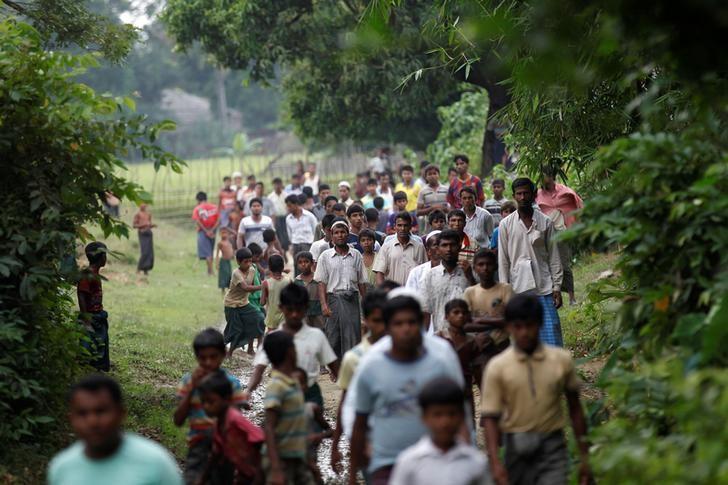
U.S. President Donald Trump’s executive orders with regards visa restrictions for people from seven Muslim-majority states has generated heat across the globe. At the same time, Bangladesh—a Muslim majority state in the Indian subcontinent—is planning to send refugee Rohingya Muslims from neighboring Myanmar to a low-lying island in the Bay of Bengal that critics say is ‘unlivable’.
According to available records, nearly 70,000 Rohingyas from Myanmar’s Muslim-majority areas in the north have fled to Bangladesh ever since the Myanmar military launched a fierce crackdown last October that led to the killings of over 100 Rohingyas and widespread damage to their protests.
The government action was aimed at nabbing unidentified Rohingya insurgents who were alleged to have killed nine Myanmar police personnel on October 9th at three border posts in the district of Maungdaw.
About 2,500 Rohingya families have since taken refuge at a makeshift camp in eastern Bangladesh’s Cox’s Bazar near the border with Myanmar—taking the number of Rohingya in Bangladesh, both the old refugees and the current ones, to an estimated 500,000 as per some estimates.
But in January, Bangladesh brought out an old and much-maligned 2015 plan from the cold storage and proposed to move all Myanmar refugees, old and new, to the island of Thengar Char, which is totally isolated and gets easily flooded on high tide days.
Defending the move, Shahriar Alam, Bangladesh’s junior foreign affairs minister, said that the “move is temporary, as Myanmar would eventually take back its citizens”.
News agency Reuters quoted him saying, “After considering all aspects, we have taken a firm decision to shift them to the island.”
The move, however, does not have a clear timeframe currently—and might begin after proper shelters are in place on the island. But one thing that Alam was adamant upon was this: “Myanmar will have to take them back.” Read ‘soon’ between the lines.
More than the current place of residence, it is the question of their identity itself that has placed the Rohingyas between the rock and a hard place. The Myanmar authorities often call them ‘Bengali Muslims’, thereby inferring that they are actually (illegal) immigrants from Bangladesh. Bangladesh, in turn, refers to them as ‘Muslim nationals of Myanmar’.
Compare it with the global umbrage directed at non-Muslim nations for identifying refugees by their religion.
Giving a sense of déjà vu with regards the turmoil in the developed world about the issue of refugees, Bangladesh is resisting the prospects of the Rohingya refugees ‘mixing with Bangladeshi citizens’.
In a January 26th release on a Bangladesh government website, it was informed that several panels were being set up by the government to examine the influx of Rohingya Muslims, which the country fears could lead to law and order issues as they mix with residents.
“There’s a fear that the influx of Rohingya Muslims from time to time will lead to a degradation of law and order situation, spread communicable diseases … and create various social and financial problems,” the notice elaborated.
Going a step further, Alam said to Reuters in an almost Donald Trump style, “They are getting involved in drugs and other unlawful activities. If we could have confined them in the camp, it would not have happened.”
Apart from Trump, many of the nationalist leaders of Europe have said something similar. The outrage directed at them has been soul-numbingly deafening. Maybe it would have helped if they were all spokespersons of Muslim nations too.
Meanwhile, Myanmar says it is “ready to talk” about the repatriation of Rohingyas—but only of those who left the country after October 9th, 2016. It says it cannot take Bangladesh’s word about all the refugees being Myanmar nationals.
In other words, a certain group is being allegedly persecuted by its native administration. But when that group tries to seek refuge in another country, it finds itself unwelcome there. But then, there is no way back home either.
Sounds familiar?
And therein lies the point. This writing is neither about the actions of Bangladesh and Myanmar, nor the current and historical state of affairs of the Rohingya Muslims. It is about requesting all of us to stop being both savage and (savagely) holier-than-thou on the issue of refugees. It is a matter of a monumental human challenge, and taking sides blindly and fanatically would not be, well, human.
Listen to the opposing voices of the host nations too. It is not always merely about xenophobia/’religio’phobia.